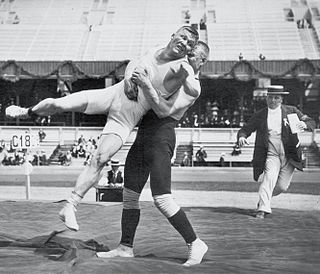Related Research Articles

Georg Karl Julius Hackenschmidt was an Estonian strongman, professional wrestler, writer, and sports philosopher who is recognized as professional wrestling's first world heavyweight champion.
Anar may refer to:

Georg Lurich was an Estonian Greco-Roman wrestler and strongman of the early 20th century. Lurich was also the trainer of Estonian wrestlers and weightlifters Georg Hackenschmidt and Aleksander Aberg.

Armen Nazaryan is an Armenian Greco-Roman wrestler who later represented Bulgaria. Nazaryan is a two-time Olympic Champion, a three-time World Champion, and a six-time European Champion. After Armenia regained independence in 1991, Nazaryan became the first Olympic gold medalist for the country. He was recognized by the FILA as the best wrestler of the year in 1998 and 2003. In 2007, Nazaryan was inducted as a member of the FILA Hall of Fame.

Estonia competed at the 1936 Summer Olympics in Berlin, Germany. It was the nation's fifth consecutive appearance at the Games since 1920, and also the last time prior to World War II. As the country was, after 1940, occupied by the Soviet Union and Nazi Germany, the next time Estonia was able to participate in the Summer Olympics as an independent nation came only with the 1992 Summer Olympics.

Voldemar Väli was an Estonian two-time Olympic medalist in Greco-Roman wrestling.

Heiki Nabi is an Estonian Olympic champion Greco-Roman wrestler.

Martin Klein was an Estonian wrestler who competed for the Russian Empire at the 1912 Summer Olympics. He won the silver medal in the middleweight class, becoming the first Olympic medalist born in the territory of modern Estonia. In the semifinal against the reigning world champion Alfred Asikainen, the two grappled for 11 hours and 40 minutes on a sunny day outdoors, until Klein managed to pin Asikainen. Klein was so exhausted from the bout – the longest wrestling match ever recorded – that he was unable to wrestle for the gold the next day, leaving Swedish wrestler Claes Johansson with the gold medal.

Anar Rasul oghlu Rzayev, known as Anar, is an Azerbaijani writer, dramatist, film director, and the Chairman of the Writers' Union of Azerbaijan. Anar is primarily a novelist and short-story writer although in the past, he has also authored screenplays and directed films as well as acted in a film.

Albert Eduard Kusnets was a middleweight Greco-Roman wrestler from Estonia. He competed in the 1924 and 1928 Summer Olympics and placed fourth and third, respectively. He won his 1928 bronze medal despite breaking a leg in 1928 and not competing until the Olympics. He earned three more medals at the European championships in 1927–1933. Kusnets missed the 1932 Olympics, because Estonia could not afford sending a team to Los Angeles during the Great Depression. After retiring in 1933 he worked as wrestling coach, and prepared the Olympic champion Kristjan Palusalu.

Eduard Pütsep was an Estonian wrestler. He competed in Greco-Roman wrestling in the 1920, 1924 and 1928 Olympics and won a gold medal in the bantamweight division in 1924, becoming the first Olympic champion in wrestling from Estonia. In 1928 he placed sixth in Greco-Roman and ninth in freestyle wrestling.

Johannes Kotkas was a heavyweight Greco-Roman wrestler from Estonia who won a gold medal at the 1952 Summer Olympics. He held the European title in 1938, 1939 and 1947 and placed second at the 1953 world championships.
Sport plays an important role in Estonian culture. Estonia first competed as a nation at the 1920 Summer Olympics, although the National Olympic Committee was established in 1923. Estonian athletes took part at every Olympic Games until the country was annexed by the Soviet Union in 1940. The 1980 Summer Olympics sailing regatta was held in the capital city Tallinn. Estonia has won most of its Olympic medals in wrestling, athletics, weightlifting, and cross-country skiing.
Jānis Beinarovičs was a Latvian athlete who won the Latvian Master's title in Greco-Roman wrestling four times between the years 1935 to 1938. He joined the Second Riga Athletic Club at the age of 17 and competed in the Bantam weight class. A cabinet maker by trade, Beinarovičs had to train in his spare time. He acquired a total of ten titles in Latvia's amateur championships during his career.
Marek Švec is an amateur Greco-Roman wrestler from the Czech Republic. He is a three-time Olympian, and also, a multiple-time medalist at both the World and European Championships. He also won the bronze medal at the 2008 Summer Olympics.
Nelson Davidyan was a Soviet Armenian Greco-Roman wrestler and coach. He was an Olympic silver medalist and two-time World and European Champion.
Tarvi Thomberg is a retired amateur Estonian Greco-Roman wrestler, who competed in the men's light heavyweight category. Thomberg represented his nation Estonia at the 2004 Summer Olympics, and has also held three Estonian and Nordic championship titles in the light heavyweight division. Before retiring from the sport in 2008, Thomberg trained as a member of the wrestling team for MK Juhan Märjamaa under his personal coach Henn Põlluste.

Edgar Puusepp was an Estonian wrestler and wrestling coach. He competed in the men's Greco-Roman welterweight at the 1936 Summer Olympics, achieving 4th place. He won a silver medal in Greco-Roman wrestling at the 1939 European Wrestling Championships.
Alo Toom is an Estonian wrestler.
Jaanek Lips is an Estonian wrestler.
References
- 1 2 3 "Anar_Zeinalov". www.esbl.ee. Retrieved 3 April 2022.